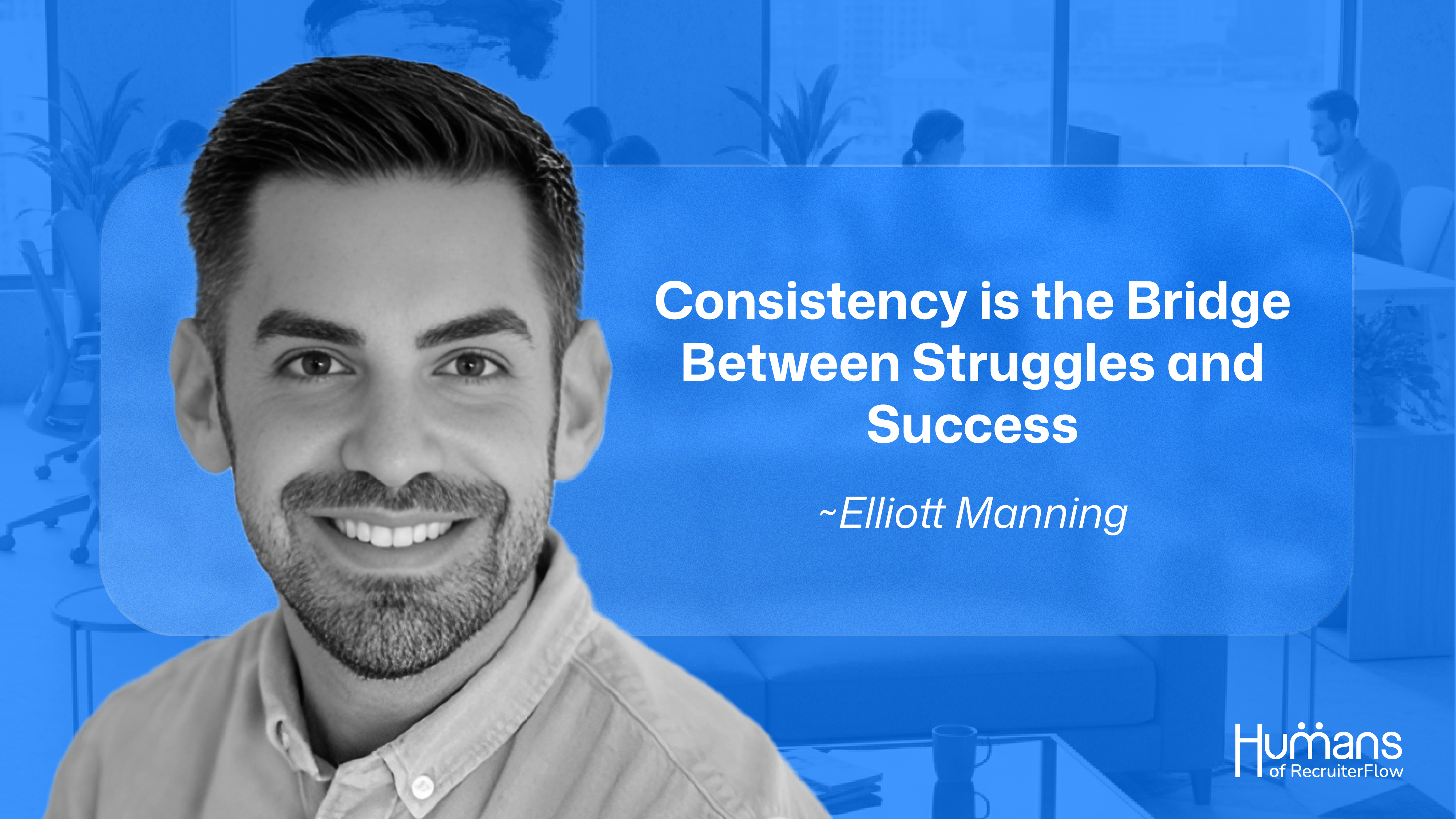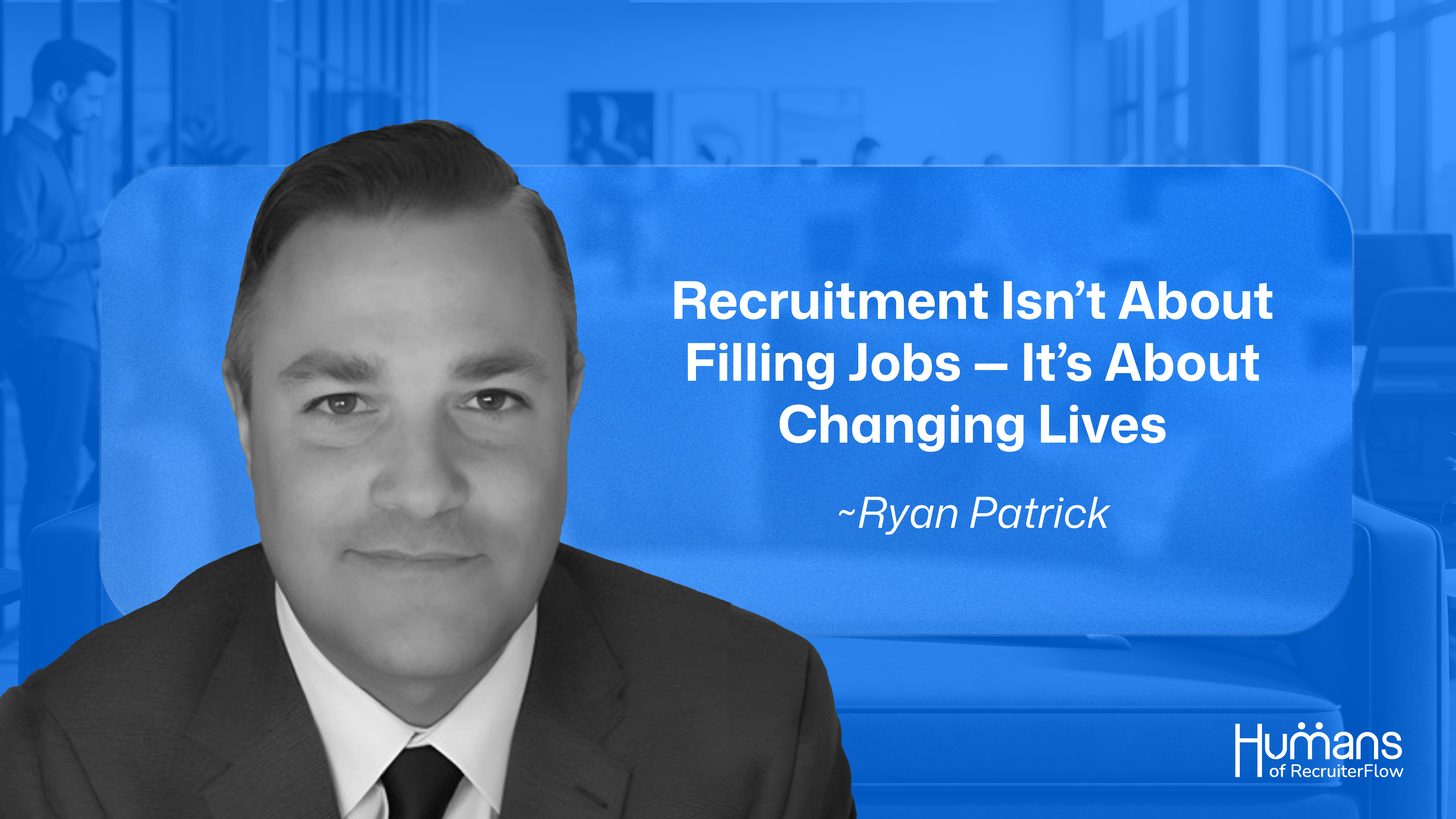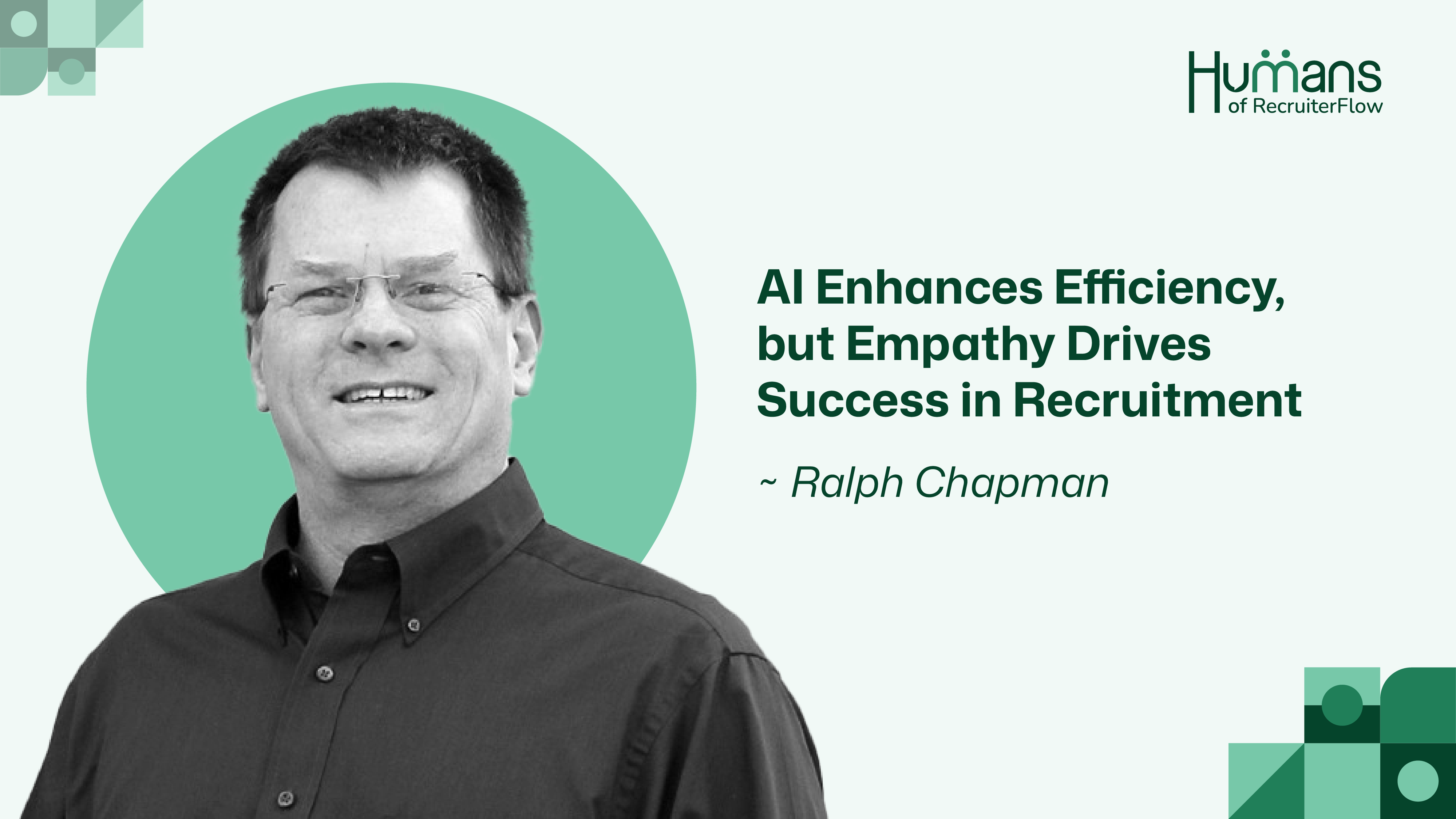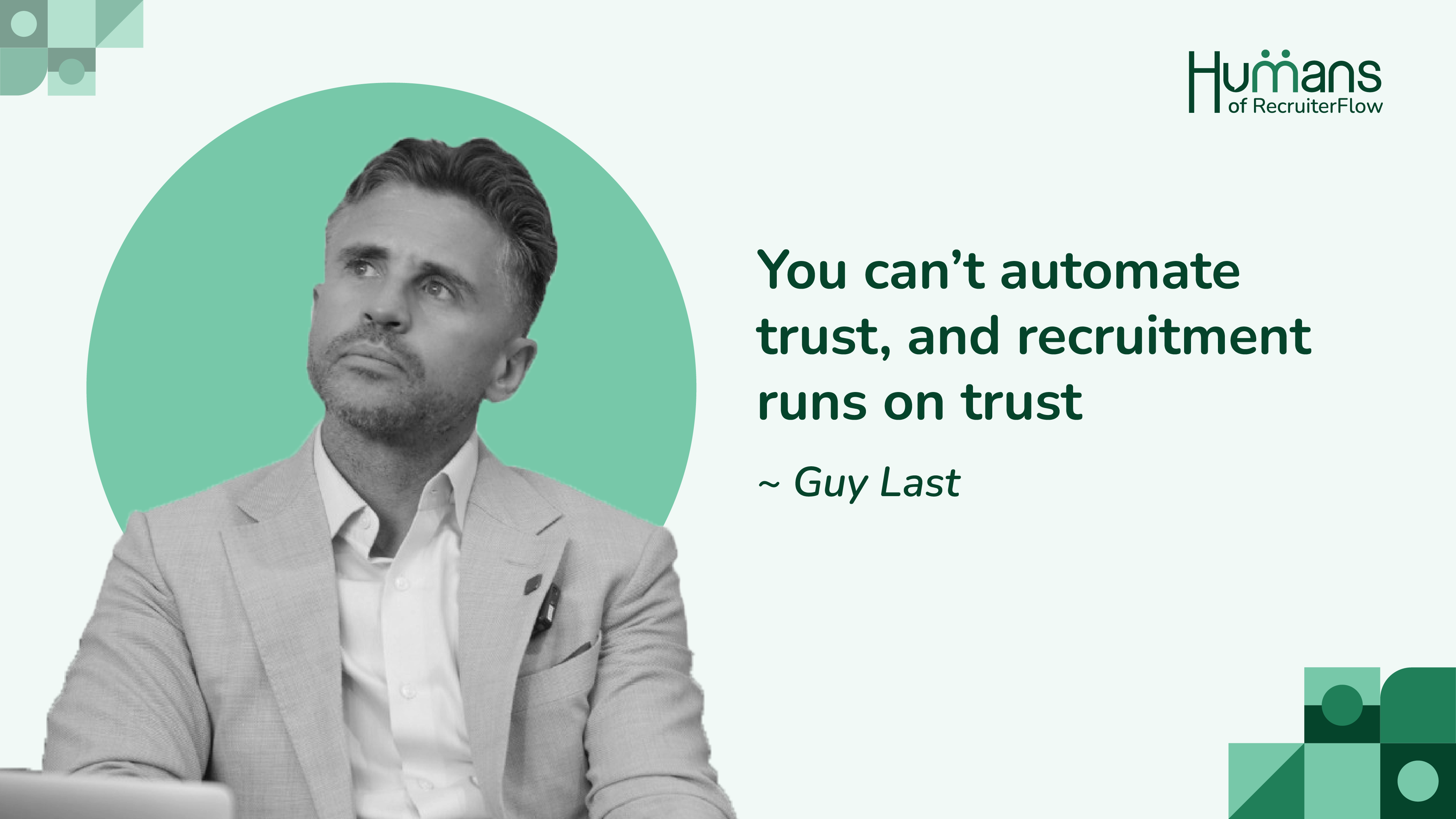
Recruitment Isn’t About Filling Jobs, It’s About Changing Lives – Ryan Patrick

After receiving so much love and warmth for our Season 1 of the Humans of Recruiterflow series, we’re back with Season 2, featuring fresh stories of recruiters who see beyond resumes and help people find their purpose.
We begin this season with Ryan Patrick Hunt, Founder of Tenth Mountain Recruiting, an agency dedicated to helping military veterans transition into civilian careers.
Most recruiters will tell you they “fell into” the recruitment industry by accident. For Ryan, this wasn’t the case; recruiting was part of his upbringing.
Ryan’s father was an entrepreneur who built a global staffing company.
“My recruiting journey actually began when I was three years old. My father was an entrepreneur, and he owned a global staffing company. He had offices in the Philippines, in Hong Kong and in the United States — and that is really where it started.”
From an early age, he was exposed to the world of business and people. Travelling with his father, he absorbed lessons that shaped his perspective.
By age 11, Ryan had lived in several countries and visited more than 30 others — experiences that taught him the value of connecting people across borders.
The Military Years
When Ryan became a U.S. Army officer, recruitment followed him there as well.
“I was a military officer in the United States Army, and during that time, I was privileged enough, actually, to exercise some recruiting.”
That period deepened his belief that recruitment isn’t just about filling jobs, it’s about changing lives.
Building His Own Path
After leaving the Army, Ryan founded Tenth Mountain Recruiting, an agency with a mission to help military veterans transition into meaningful civilian careers.
For him, recruitment has always been more than a career.
“A lot of people fall into recruiting, and it can definitely be a lucrative industry. It can also be very tough. But what sets us apart is that we take an altruistic stance. We really believe that through recruiting, through talent acquisition, we can change lives.”
That belief has guided him since childhood — and continues to drive his work today.
Redefining Success Beyond the Offer Letter
For Ryan, success is not a single milestone; it’s a continuous journey. It’s a combination of impact, growth, and family. It’s the satisfaction of helping someone land a job, seeing a veteran thrive in civilian life, preparing his children for their future, and embracing every mistake as a stepping stone.
“Success in the recruiting field is being able to just help people and elevate them from their current position. Maybe some of them are unemployed, or they’re looking for better opportunities. If I have the opportunity to help elevate them, that makes me pretty happy.”
Sometimes, that success comes not from a placement but from mentorship and networking.
“Sometimes we may not even place them, but by using our broader network of military veterans in recruiting, we’re able to connect and elevate people who are looking for jobs. That’s success.”
And personally? It’s about family and growth.
“Personally, success is my family — my children. Making sure they’re prepared for their next step, leaving the nest, that’s very important to me.”
“Success is also continuing to learn and stretch, getting out of my comfort zone, and failing forward a lot. Every time I’m failing, I’m actually succeeding because I’m learning something.”
A Modern KPI Mindset
In a world obsessed with activity-based metrics, Ryan focuses on quality.
“The most important KPI for me personally is: what is the retention rate of our candidates that have been placed? Offers, yes, that’s how we make money. But where are these candidates after a year? Where are they after two years, and three years?”
He also tracks fill rate and time to fill — but rejects vanity measures, such as call volume.
“I don’t really care how many calls a recruiter makes. I don’t even believe in calling. LinkedIn provides a powerful tool that allows you to go out there, change the world, and potentially earn a significant amount of money. That’s how I prefer to outreach.”
For Ryan, KPIs aren’t about spreadsheets — they’re about proving that great talent has found the right home.
How AI Is Changing Recruitment
Artificial Intelligence is reshaping recruitment, but Ryan doesn’t see it as a threat.
He has tested countless recruiting tools and platforms, and he’s convinced that AI is here to stay.
“When you integrate AI into Recruitment, you start to see some really dynamic things. It can save a lot of time, and it can also save money.”
From automating resume screening to streamlining candidate communication, AI enables his team to move faster without losing focus on what truly matters.
What AI can’t do is replace the human touch.
“I don’t think we get rid of recruiters just because we have AI. I believe now recruiters are becoming AI recruiting coordinators or AI recruiting managers. They’re evolving — but at some point, there still has to be a human touch. It’s called human resources for a reason.”
For Ryan, recruitment is, at its core, about people. AI may optimise the process, but it can’t replace empathy, trust, or relationship-building.
“For some roles, AI is a perfect solution. But if I’m talking to a VP of Sales, a Head of Recruiting, or a Head of Marketing, that has to be a personal, one-on-one conversation.”
This nuanced view shows how he blends efficiency with humanity. Use AI where it makes sense, but never let it replace the recruiter’s role in building meaningful connections.
Ryan’s Advice to Fellow Founders: Recruitment Is Sales, and Networking Is Everything
When Ryan talks to fellow founders about recruitment, his advice is rooted in both experience and simplicity. For him, building a recruitment business or any business requires mastering fundamentals.
Recruitment is Sales
“Recruiting is a huge part sales — whether you’re doing the business development or actually having a conversation with a candidate. Every intake call, every presentation follows a sales line.”
He even draws parallels to established sales methodologies.
“Usually, I have a five-step method for recruiting calls. It’s very similar to Sandler’s seven-step sales method. You start with a warm-up, set the agenda, ask discovery questions, uncover pain points, and outline next steps. It’s all a sales process.”
For founders, that means learning sales isn’t optional; it’s survival.
“As a founder, you’ve got to know how to sell yourself, your company, and your vision. Otherwise, your profit and loss is going to be more red than green.”
Don’t Be Afraid to Network
The second pillar of Ryan’s advice focuses on connections.
“Don’t be scared to network. They say it — your network is your net worth. The more you get out there, the more opportunities come your way.”
He stresses that founders should immerse themselves deeply in their niche.
“If you decide, ‘I am a technical recruiter and all I do is nurses,’ then you better be out there shaking hands and meeting every single nurse you can. Build that network relentlessly.”
Growth Through Mentorship
Ryan also encourages founders to seek guidance and never stop learning.
“Get a mentor. Get a coach. Continue to learn and grow — not just in recruiting, but in business and leadership as a whole.”
For him, mentorship is not a sign of weakness, but a way to accelerate growth and avoid costly mistakes.
In an industry full of noise, Ryan brings it back to fundamentals. Founders don’t just need tools or hacks; they need persistence, relationships, and a sales mindset to thrive.
The Talent Sherpa
From his father’s global staffing company to his Army days and Tenth Mountain Recruiting, Ryan’s story is one of legacy, resilience, and service.
What sets him apart is his conviction that recruitment is about more than jobs — it’s about guiding people through life’s toughest climbs.
“We call ourselves talent acquisition sherpas. Sherpas guide others through the toughest climbs — and that’s what we do for our clients and candidates.”
And that is the essence of Ryan’s journey: not just a recruiter, but a guide, a mentor, and a life-changer.
Humans of Recruiterflow



Sagrika Jain